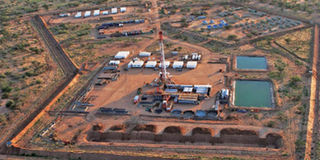Why gains from oil remain a pipe dream for many in Turkana

An aerial view of a Tullow oil rig in Turkana County. Frustrated residents who have promised to block any oil from leaving the region unless the government allocates them a higher percentage of its revenue. PHOTO | FILE | NATION MEDIA GROUP
What you need to know:
As the country patiently waits for the first truck carrying crude oil to be flagged off in Lokichar, Turkana County, the challenges facing that prospect are mounting day and night.
Last month, Petroleum and Mining Cabinet Secretary John Munyes said the first barrel of oil will be taken to Mombasa before the end of May.
Unfulfilled promises are now almost uncountable, and the anger of the locals is almost boiling over.
The oil dream may not be coming true. Not that soon.
Not with the challenges facing the planned Early Oil Pilot Scheme that the government had promised before the end of this month.
Last month, Petroleum and Mining Cabinet Secretary John Munyes said the first barrel of oil will be taken to Mombasa before the end of May.
When he recently visited Turkana Governor Josephat Nanok, the CS insisted that the plan was still on course despite noticeable hurdles stacked against that possibility.
BANDITS
As the country patiently waits for the first truck carrying crude oil to be flagged off in Lokichar, Turkana County, the challenges facing that prospect are mounting day and night.
From frustrated residents who have promised to block any oil from leaving the region unless the government allocates them a higher percentage of its revenue, to poor infrastructure that includes a non-existent critical bridge and rising insecurity as bandits target motorists along the Kainuk-Lokichar road, the promise to start exporting oil before the end of this month might not be realised yet.
The tension in Lokichar is palpable, the expectations untamed. And the number of threats to that desperate dream of joining the exclusive league of global oil producers keeps going up with every sunrise.
Unfulfilled promises are now almost uncountable. And the anger of the locals is almost boiling over.
EXPANDED
Lokichar — soon to become the centre of oil activity in the whole country — teems with life. It is a town that has grown in all aspects since oil was discovered in the area in March 2012. Once a centre of all kinds of banditry, it has gradually mutated into an important town.
It now acts as a perfect entrance to the fields where Kenya expects to mine millions of barrels of oil and export it for refining although plans are afoot to revive the defunct oil refinery in Mombasa.
The town has expanded tremendously over the past seven years. Once another struggling centre in the middle of an arid area hosting hundreds of internally displaced people who left their homes during the 2007/08 post-election violence, Lokichar now boasts permanent buildings, electricity, passable roads, restaurants, pubs, churches and schools.
With the influx of people from all sides of the country, conversations here are rarely in the local dialect, Turkana, unlike before when it was difficult to talk to locals without an interpreter.
The national languages are prospering here.
POOR ROADS
But that is about the only good the oil discovery has brought to the region, going by what most locals say.
The Ngamia 1 oil field is located in Nakukulas village in Turkana East, some 40 kilometres from Lokichar, and is connected by a poor road that is now being upgraded although at a pace residents complain is not satisfactory. There are other oil fields spread across the region.
The contractor has been hurrying to lay tarmac on the road from Lokichar to the oil fields but has been stopped by heavy rains falling in the area.
Other than the poor roads, the residents in this village say all the sweet things expected to be brought by oil remain a pipe dream. They say all the good things have ended up in Lokichar and its surroundings.
GRIEVANCES
At least 15 men had gathered at the village’s meeting point when the Sunday Nation met them recently. Although at first they were reluctant to speak about their grievances, saying they had been doing so for years without getting any feedback, they opened up with the hope that they would be listened to this time round.
The bitterness of gaining nothing from a soon-to-be lucrative venture is almost palpable.
“We have agreed to the exploration of the oil. But there is nothing good for us at all. Even with our agreement, nothing has been given to us as a way of appreciation,” Mr Muya Lowoto, the elders’ spokesman, said through an interpreter.
“If anyone cared about us, do you think we would still be living in these manyattas?” asked Mr Lowoto, pointing at a kraal consisting of dozens of manyattas.
PROJECTS
He said they expected better houses as a way of thanking them for remaining peaceful and allowing Tullow to continue with its exploration without any disturbance or frustrations.
They also said they had been promised a health facility but it was yet to be constructed.
The oil company, however, said it had worked closely with the villagers and that it had set up various social projects for the local community.
Tullow Country Manager Martin Mbogo said they had planned to build a hospital at Nakukulas but that the plan changed and the facility was moved to Lokori, following a decision by the villagers.
“Tullow has initiated several social investment projects including construction of dormitories at Nakukulas Primary School and water projects,” he said.





